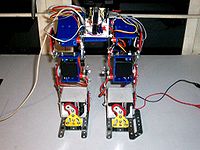Informatics Engineering
Computer engineering is the branch of engineering that applies the fundamentals of computer science, computer engineering, information systems engineering, software engineering, data engineering, artificial intelligence and network and communications engineering, for the development of comprehensive computing and communications solutions, capable of processing information automatically.
Areas of professional competence
The knowledge to practice as a Computer Engineer encompasses a large number of theoretical areas within the Applied Science called Computer Science that confer the following professional skills:
- Knowledge of Teoría de la información y Telecomunicaciones to calculate and design models and networks of communication of information by safe and legal channels that allow their control and audit to meet security and availability needs.
- Knowledge of automaton Theory and Theory design algorithms and formal languages to design the ideal automation solutions in the processing of information.
- Software engineering knowledge to evaluate the best techniques of design, construction and maintenance of software, subject to calculations of quality restrictions, time, cost, etc.
- Knowledge of artificial intelligence or knowledge engineering such as the recognition of patterns or neuronal networks to calculate and design knowledge production systems as an industrial competitive advantage in the management of information.
- Electronic knowledge to calculate and design communication and control interfaces between computers and various mechanical and electrical devices, such as data acquisition systems, virtual instrumentation, robot control, lighting systems or others.
- Knowledge of industrial and business organization, for the planning, management and control of computer projects and the management of ICT departments.
- Knowledge hardware to analyze and design solutions in the field of microprocessor architecture.
Professional regulation in Spain
The profession of Computer Engineer is a profession legally protected by official university studies and by powers of professional competence that are currently barely legislated. These attributions are included generically within those of any Technical Engineer. This national regulation model implies a legal anomaly compared to other Engineering for what it supposes of legal inconcretion on the competences with civil and penal responsibility of the engineers dedicated to the automatic treatment of the information. Given that these issues are not specified in the 1986 Law, today there are numerous legal loopholes to avoid professional intrusion and to be able to demand quality solutions with which to provide guarantees to consumers and society that there are no industrial production failures due to errors. of professional capacity. The situation that has occurred is a bad political example of how a nation must be organized to be technologically industrialized and competitive.
The Spanish collective of Computer Engineers, together with all the colleges and associations of computer engineers have requested regulation on countless occasions from the Ministry of Industry, Tourism and Commerce, in an attempt to put an end to the existing comparative grievance with the rest of engineering, aware of the political error for the progress of the country. On November 6, 2007, there was a concentration of Computer Engineers in Madrid. In it, around a thousand professionals and students were informing citizens about the situation of legal helplessness that the profession is experiencing.
Subsequently, on November 19, 2008, more than 45,000 students and graduates in Engineering and Technical Engineering in Computer Science took to the streets in 35 cities throughout Spain to demand regulation of the profession, as well as equal treatment with respect to the regulated engineering for the process of adaptation to the new European Higher Education Area (commonly known as the Bologna Process, as well as in the controversial and complex transposition of the European Services Directive. These mobilizations were followed by others of lesser importance on various dates such as December 20 in Madrid, or March 27, 2009 in La Coruña and Seville.
As a first step, thanks to these mobilizations, the creation of both the Council of Computer Engineering Colleges and the Council of Technical Computer Engineering Colleges has been achieved, a claim that had been frozen and ignored for years by the Administration.
In Spain, the university degree that gives access to the profession of Computer Engineering is the Official Master's Degree in Computer Engineering. On the other hand, the University Degree in Computer Engineering gives access to the profession of Technical Engineer in Computer Engineering.[citation required]
Contenido relacionado
Session layer
SCADA
Binary system

